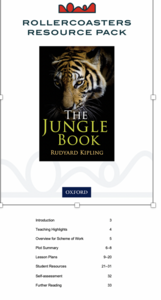ReadWriteThink
Concept Map
When you think of one topic, related ideas and details invariably follow. That's concept mapping! Jot down ideas with a straightforward graphic organizer that works both electronically and as a printed resource.
Reed Novel Studies
Danny The Champion of The World: Novel Study
Many children dream about being a champion. The dream could be reality for Danny in Danny the Champion of the World. Danny's championship is a sure thing if he and his father gain victory against a nasty landowner with a bad attitude....
PBS
The Lorax
Accompany a reading of Dr. Seuss' tale, The Lorax, with a five-item worksheet. Questions challenge scholars to list characters' names, use text details to answer inquiries, and describe the moral of the story.
Oxford University Press
The Jungle Book
Most every teacher dreams of a ready-to-teach and print book study. Well, here it is! The Jungle Book novel resource includes 12 complete lessons studying poetry, author's craft, themes, characters, and more. Scholars role play, research...
PBS
Concept Map
Make the thought process visible with a handy concept map organizer. As learners develop their main ideas in research, writing, or creative development, they can add details and like ideas to the worksheet as needed.
Meadows Center for Preventing Educational Risk, University of Texas at Austin
Lesson 16 - Adding Vowel Suffixes to CVC and Silent E Base Words
There's a big difference between hoping and hopping. A lesson on adding vowel suffixes discusses when to double a consonant before adding a suffix such as -ed or -ing. Readers practice breaking down words into syllables and creating new...
Meadows Center for Preventing Educational Risk, University of Texas at Austin
Lesson 17 - Adding Suffixes That Change Base Words' Finally to I
If it ends in a y, change the y to i when adding a suffix like -ness, -ly, or fy. The final lesson in the Word Recognition and Fluency series of 17 explains when to change the final letter in a base word to i before adding a suffix....
Meadows Center for Preventing Educational Risk, University of Texas at Austin
Lesson 15 - Soft G and Soft C
The names Cindy and Carrie start with the same letter, but have very different sounds. The 15th of 17 word recognition lessons focuses on the soft C sound found in Cindy and the soft G sound found in Gene. Direct instruction starts with...
Meadows Center for Preventing Educational Risk, University of Texas at Austin
Lesson 14 - Consonant-Le Syllables
The consonant-le syllable may appear in the word idle, but it is anything but dull. An informative lesson plan introduces words containing the consonant-le syllable. Using guided instruction, learners discover how to break words...
Meadows Center for Preventing Educational Risk, University of Texas at Austin
Lesson 13 - Multisyllabic Word Reading
One- and two-syllable words may flow from the tongue with ease, but longer words, such as department and volcano, feel like tongue twisters. Scaffolded instruction explains how to break words into their individual syllables, and then...
Meadows Center for Preventing Educational Risk, University of Texas at Austin
Lesson 12 - Ed Suffix with Unchanging Base Words
Understanding different verb tenses begins with knowing how to decode words. A lesson on the -ed suffix with unchanging base words introduces readers to the past tense. Teachers present the skill with oral reading and spelling...
Meadows Center for Preventing Educational Risk, University of Texas at Austin
Lesson 11 - Affixes with Unchanging Base Words
Adding an affix to a word sometimes changes its meaning, just like magic. Using 11th of 17 lessons in the Word Recognition and Fluency series, readers become vocabulary magicians, learning to form and decode words that contain common...
Meadows Center for Preventing Educational Risk, University of Texas at Austin
Lesson 9 - Contractions
Is it do'nt or don't? How about doesn't or does'nt? A lesson on contractions helps learners identify, form, and use contractions. Components within the plan include direct instruction on decoding and encoding contractions, as well as...
Library of Congress
Jack and the Beanstalk
A poor boy's dreams come true with a hand full of beans in Jack and the Beanstalk. After Jack throws out beans, they grow into a giant beanstalk—where an angry giant waits to greet him. Scholars read in an easy-to-use format to find out...
Meadows Center for Preventing Educational Risk, University of Texas at Austin
Lesson 5 - R-Controlled Syllables
Put on your pirate hat and get ready to teach r-controlled syllables. Learners practice using words that contain ar, or, er, ir, and ur. Instructors model how to decode words to isolate vowel teams, as well as combine r-controlled sounds...
Meadows Center for Preventing Educational Risk, University of Texas at Austin
Lesson 6 - Vowel-Consonant-E Syllables
Adding an e sometimes significantly changes the pronunciation of a word. An informative instructional activity introduces Vowel-Consonant-E syllables by helping learners see the difference between the pronunciation of words like mop and...
Meadows Center for Preventing Educational Risk, University of Texas at Austin
Lesson 7 - Letter Combinations
Individually, letters have their own sounds, but when combined with other letters, those sounds completely change. Introduce letter combinations with a lesson that asks learners to search for combinations in familiar words and use oral...
Meadows Center for Preventing Educational Risk, University of Texas at Austin
Lesson 8 - Open Syllables
Just like scholars plug something in to close a circuit, they must plug a consonant onto a word to make closed syllables. Help learners distinguish between open and closed syllables with a series of activities that emphasize open...
Reed Novel Studies
The Penderwicks: Novel Study
Have you ever tried to fix something but actually end up making it worse? This is exactly what happens to three girls in Jeanne Birdsall's The Penderwicks. Scholars read about the efforts of the girls and complete worksheet pages that...
Penguin Books
Addressing Text Complexity - Making Independent Reading Meaningful
Many English teachers dream of a classroom full of readers silently enjoying their books. A useful guide helps make that dream become a reality by providing book recommendations for a range of readers. Each suggestion includes the...
K12 Reader
Writing with Interjections
Challenge young writers to craft original sentences using interjections from a list provided on a colorful worksheet.
K12 Reader
Mild and Strong Interjections
Whew! This worksheet is tough! Unless, of course, young grammarians know the difference between mild and strong interjections.
K12 Reader
Find the Interjection
Yikes! Young grammar sleuths must find the interjections that add the oomph to a series of sentences.
K12 Reader
Interjections in Dialogue: Tom Sawyer
Mark Twain is a master of using interjections in his dialogue. A grammar worksheet focused on interjections features the passage from The Adventures of Tom Sawyer in which Tom tricks Ben into taking on the job of whitewashing Aunt...
Other popular searches
- 5th Grade Language Arts
- 3rd Grade Language Arts
- 4th Grade Language Arts
- Second Grade Language Arts
- English Language Arts
- 1st Grade Language Arts
- Kindergarten Language Arts
- Language Arts Jeopardy Game
- First Grade Language Arts
- Language Arts School Projects
- Language Arts Lesson Plans
- Language Arts Games

























